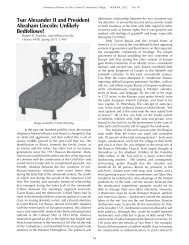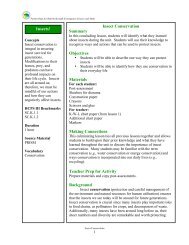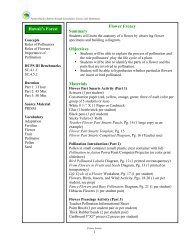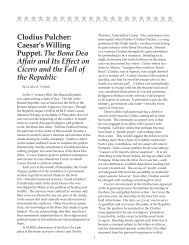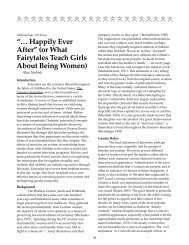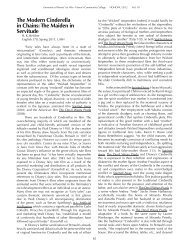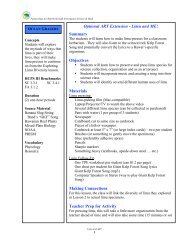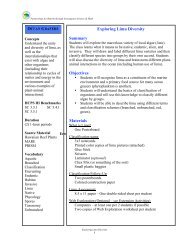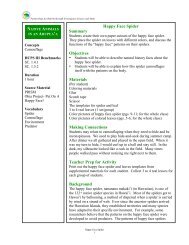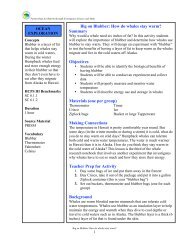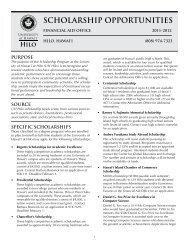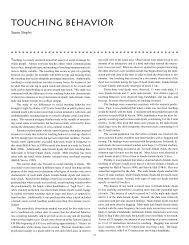A JOURNAL OF ACADEMIC WRITING VOLUME 8
A JOURNAL OF ACADEMIC WRITING VOLUME 8
A JOURNAL OF ACADEMIC WRITING VOLUME 8
You also want an ePaper? Increase the reach of your titles
YUMPU automatically turns print PDFs into web optimized ePapers that Google loves.
d d d d d d d d d d d d d d d d d d d d d d<br />
“They’re OK if They’re<br />
Our S.O.B’s”<br />
United States involvement in the<br />
1954 Guatemalan Coup d’état<br />
Robert Franklin<br />
History 383<br />
The United States Cold War history is shrouded in<br />
secrecy, and when revealed, it is approached with feelings of<br />
shame, anger, and frustration at events perpetuated by the U.S.<br />
government and foreign interests. Peering into recently opened<br />
Central Intelligence Agency documents and the memoirs of<br />
those prominent individuals in the Truman and Eisenhower<br />
Administrations, casts new light on the U. S. role in shaping<br />
the emerging governments of underdeveloped nations in Latin<br />
America. Of these, the 1954 Guatemalan Coup d’état bears<br />
an obvious U. S. signature, both in the particular form of the<br />
coup (similar tactics were used in Iran in 1953) and the colossal<br />
misunderstandings in which the Coup succeeded. The U. S.<br />
misjudged the socialist reforms and communist presence in<br />
Guatemala’s new revolutionary government as the work of<br />
international communism looking to establish a Latin American<br />
Kremlin that would destabilize the United States economic and<br />
political interests in Latin America. The U.S. felt this view gave<br />
them the justification to instigate the 1954 Coup d’état that,<br />
due to a crucial lack of military support for the revolutionary<br />
government, replaced the Jacobo Arbenz administration with<br />
the U.S. supported Castillo Armas. This intervention by the<br />
U. S. in overthrowing a democratically elected government ran<br />
counter to its pro-democracy rhetoric, but fit perfectly in the<br />
line of Cold War foreign policy that sought to protect, at any<br />
cost, U.S. hegemony in the Western hemisphere.<br />
From independence to the establishment of a<br />
democratically elected government in 1944, Guatemala<br />
progressed through a series of dictators. In 1872, a liberal<br />
government under President Justo Rufino Barrios took power,<br />
marking a transition from a largely internal and atrophied<br />
economy to nascent industrialization and foreign investment. 1<br />
Barrios established freedom of religion on March 15, 1873, in<br />
an attempt to weaken the control of the Catholic Church, while<br />
simultaneously encouraging immigration from “protestant and<br />
1 Virginia Garrard Burnett, “Protestantism In Rural Guatemala, 1872-<br />
1954,” Latin American Research Review 24, no. 2 (1989): 127.<br />
modern countries” such as the United States and Germany. 2<br />
Barrios hoped that an influx of Protestant missionaries would<br />
bring the values and appetites of their capitalist societies<br />
with them to Guatemala and act as a subtle influence on the<br />
Guatemalan people.<br />
Pro-western reforms by the “liberals” had the effect of<br />
changing land ownership, but not in a way that benefited the<br />
majority of the population 3 . The system of unequal distribution<br />
of land was a major cause of the 1944 revolution and the issue<br />
of land reform is crucial to understanding the events leading up<br />
to the 1954 Coup. In the late nineteenth and early twentieth<br />
centuries, Caudillos (elite landowners) and the government<br />
increasingly sold land to foreign business interests in the banana<br />
and coffee export markets. These companies offered low wages<br />
and relied on a system of forced labor to staff the ever-growing<br />
Latifundias, or large scale export farms 4 . The power of export<br />
agriculture in Guatemala cannot be overstated—at the time of<br />
the 1944 revolution bananas and coffee grown for export made<br />
up 90% of agricultural production. 5 Bananas were the majority<br />
of crops grown on these Latifundias, and require periodic<br />
rotation on different plots of land to fallow, making large<br />
scale ownership of prime agricultural land necessary by export<br />
companies. Ethnic Mayan Indians often owned very small<br />
plots of agriculturally poor land, or Minifundias. 6 Due to the<br />
shortage of land available for personal cultivation, Minifundias<br />
were heavily planted on with no room to fallow, creating poor<br />
soil conditions and an ever increasing reliance on the poor<br />
wages provided from agricultural labor.<br />
The United Fruit Company, or UFCO, was the main<br />
exporter of bananas in Guatemala, and the source of serious<br />
resentment from the population and later Arevalo and Arbenz<br />
governments. From its formation in 1899, UFCO, known<br />
in Guatemala as el pulpo (the octopus), worked to secure a<br />
very profitable and monopolistic business environment in<br />
Guatemala. UFCO was the largest private landowner in<br />
Guatemala with just over three million acres, bringing its<br />
total property to more than the combined holdings of half of<br />
Guatemala’s landowning population. 7 UFCO garnered an<br />
exclusive contract to transport the country’s mail to the United<br />
States, owned 690 out of 719 miles of railroad track and the<br />
shipping company (the International Railways of Central<br />
2 Burnett, “Protestantism In Rural Guatemala,” 128.<br />
3 Ibid, 127.<br />
4 José M. Aybar de Soto, Dependency and Intervention: The Case of<br />
Guatemala in 1954, (Boulder: Westview Press, Inc., 1978), 160<br />
5 Richard H. Immerman, The CIA in Guatemala: The Foreign Policy of<br />
Intervention, (Austin: University of Texas Press, 1982), 30.<br />
6 Aybar de Soto, Dependency and Intervention, 160.<br />
7 Immerman, The CIA In Guatemala, 71.<br />
HOHONU Volume 8 2010 - 29



